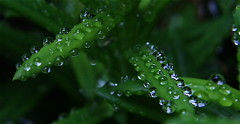Healing Waters
The waves, relentless in their cycle, wash the rocks in Maine while I watch each repetition. One wave carries foam, spindrift, and spends it on a barnacle encrusted rock. Spray, a geyser of white, engulfs a lobster trap hiding the red and yellow bands. Sounds echo.
The lachrymal or watery layer of my eye contains salts. My tears taste salty.
Immersion
To swim underwater
To hold your breath until that feat robs you of another second without air
To slowly enter the frigid Maine waters inch by inch
To let go of a rope hovering three feet over Lake George and drop into the water...
To immerse yourself in a watercolor painting — trying to replicate water flowing over rocks and grasses—
I wet the heavyweight paper and apply color washes. The water has its way. One tributary runs down the paper finding its own path.
The Missouri River is a tributary of the Mississippi River, yet it is two hundred miles longer. I've always wanted to go to Itasca, Minnesota where the Mississippi begins. Beginnings—promises of possibilities.
Imagine traveling down the Nile? Begin at the beginning and keep at it for approximately 4,000 miles. or wend your way down the Amazon, 3,980 miles through South America.
Pedro Teixeira traveled down the Amazon in 1637 – 38
“ Two Americans have made history by completing one of the last great adventures of the modern age -- the first complete descent of the Nile river from its source as the Blue Nile in Ethiopia to the shores of Alexandria where it spills into the Mediterranean Sea. Pasquale Scaturro of Colorado and Gordon Brown of California reached the mouth of the Nile on April 28, 114 days after launching their epic …journey.”
Baptism
Baptism.
Dabs of water or full immersion? Once upon a time, isn't that the way stories begin, I was baptized with dabs of water. Later, the story continues, I returned to different waters.
I joined the group of women who entered a swimming pool, our Mikveh, and said the traditional prayers. Immersed in the water I said the few Hebrew words I knew.
Replenish
I am replenished by the sound of water moving slowly against the lip of a lake or water carving calligraphy on the sand as it retreats to the ocean.
When I hiked down to Crater Lake, the deepest lake in the United States at 1932 feet, I embraced the clarity of the water and the piercing blue color.
Tears
Eyes, a reservoir of tears, saved or spent over the years: on a sad movie, a mud slide taking innocent lives, newspaper stories of errant decisions resulting in horrific outcomes, political oppressions, religious brutality, the path of history and the salty tears reserved for the personal.
For my daughter
May the waters of healing,
flow through your body.
From Rabbi Milgram’s prayer for healing





